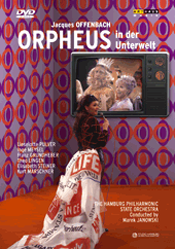Even at the distance of over
35 years, this production of one of Offenbach’s best-known works transcends the screen as a
quite engaging video that works well in this well-conceived translation.
In using fantasy to parody the conventional story of Orpheus, Offenbach created an operetta that
at once through the story on its ear and also satirized the bourgeois aspects of his culture. With
Euridice as not entirely unwilling about leaving her mundane existence, Offenbach creates a
character who is also skeptical about her life in the supernatural domain. The trade-offs that are
part of the world weigh strongly in the plot. At the same time, the revolt of the gods and
goddesses against Zeus because of their unflagging diet of ambrosia and nectar is a foil that
reflects the uprisings in Europe, including France in 1848. Characterized by some as frenetic
when it comes to the flow of ideas, Offenbach’s Orphée aux enfers demands an a style of
production that allows the ideas to flow easily between musical numbers and pieces. While this is
possible on stage, it is impossible to miss when filmed, and this production succeeds in capturing
the momentum that is essential to this work. Janowski and the crew responsible for this
production created production that is works cinematically, while not losing any sense of theater
and, most of all, the musical style.
Over the years, productions have depicted the setting in various ways, with some degree of
contrast supporting the difference between earthly life and the divine. This production uses the
frame of the television to allow the character eponymously named Public Opinion to lead the
viewer to the television screen that reveals the production. As to earthly existence, it is somewhat
plainly German and definitely peasant, while the gods have the obligatory gowned costumes that
are sometimes adorned with accouterments connected to the identity of various individuals.
As to the specific character of this production, it is a product of the 1970s, with some of pop-art
primary colors characterizing some sets, while several of the women’s costumes suggest the
Carnaby-street sensibility that may suggest the time. One element that dates the production is
Public Opinion’s skirt made of covers of Life magazine, which is no longer published in the
format popular at the time. At present, the slender pictorial entitled Life that some US
newspapers carry is a shadow of the more substantial periodical that appeared in the 1960s and
1970s. Yet these are minor quibbles, that should not detract from the overriding quality of the
production that remains evident after three decades.
Notwithstanding the involvement of forces from the Hamburg Opera, this production is
essentially a film of the operetta, not a film of a performance on stage. By using this approach,
the director can effect the quick transitions and establish pacing that allows the production to
flow smoothly between scenes. Likewise, the audience is absent, but unlike some filmed opera
that suffer from the lack of the dynamic involvement of the audience, the performance is as vital
as if it were performed in a theater.
The production included actors from the popular stage, both musical and otherwise, as well as
some fine singers, William Workman as Pluto and Franz Grundheber as Mars stand out for their
fine vocal work. Yet the singing actress Inge Meysel as Juno plays the role affably, with her
moment of confusion between revolution and resolution is worthy of a seasoned Ruth in Gilbert
and Sullivan’s Pirates of Penzance. As John Styx, a role akin to that of the jailer in Johann
Strauss II’s Die Fledermaus, Theo Lingen delivers a finely comic line that emerges both in his
acting and singing. The other performances are equally fine, and the entire cast works well in the
various ensembles that interweave the work. Overall the spoken German is a model of clarity,
but those who do not understand the language have the benefit of subtitles in English, German,
French, Italian, Spanish, thus making this fine performance accessible to a wide audience. The
sound is quite good, and the recording quality high. From the display, it appears that this is a
transfer, but there are no distortions in the digital images.
Of course, Offenbach’s famous “Can-can” occurs at the end of the work, and it conveys the spirit
of the work, albeit with a Teutonic accent. That number, as well as the entire production, is worth
viewing. Although some may prefer their Orphée in French, this German translation is every bit
as lively as some of the finer Gallic productions. Listed on the DVD case as a “Historical Studio
Production from the Hamburg State Opera 1971,” this rubric should by no means convey the
sense of a dusty, old artifact. Even the warning about the quality of the original film is, perhaps,
overly cautious, this is a fine production that has much to offer decades it was first viewed.
James L. Zychowicz
